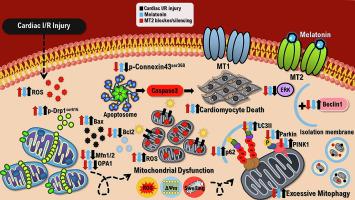Journal of Advanced Research ( IF 10.7 ) Pub Date : 2020-09-28 , DOI: 10.1016/j.jare.2020.09.007 Kodchanan Singhanat 1, 2, 3 , Nattayaporn Apaijai 1, 2 , Thidarat Jaiwongkam 1, 2 , Sasiwan Kerdphoo 1, 2 , Siriporn C Chattipakorn 1, 2 , Nipon Chattipakorn 1, 2, 3

|
Introduction
Previous studies reported the beneficial effects of pretreatment with melatonin on the heart during cardiac ischemia/reperfusion (I/R) injury. However, the effects of melatonin given after cardiac ischemia, as well as its comparative temporal effects are unknown. These include pretreatment, during ischemia, and at the onset of reperfusion. Also, the association between melatonin receptors and cardiac arrhythmias, mitochondrial function and dynamics, autophagy, and mitophagy during cardiac I/R have not been investigated.
Objectives
We tested two major hypotheses in this study. Firstly, the temporal effect of melatonin administration exerts different cardioprotective efficacy during cardiac I/R. Secondly, melatonin provides cardioprotective effects via MT2 activation, leading to improvement in cardiac mitochondrial function and dynamics, reduced excessive mitophagy and autophagy, and decreased cardiac arrhythmias, resulting in improved LV function.
Methods
Male rats were subjected to cardiac I/R, and divided into 4 intervention groups: vehicle, pretreatment with melatonin, melatonin given during ischemia, and melatonin given at the onset of reperfusion. In addition, either a non-specific melatonin receptor (MT) blocker or specific MT2 blocker was given to rats.
Results
Treatment with melatonin at all time points alleviated cardiac I/R injury to a similar extent, quantified by reduction in infarct size, arrhythmia score, LV dysfunction, cardiac mitochondrial dysfunction, imbalance of mitochondrial dynamics, excessive mitophagy, and a decreased Bax/Bcl2 ratio. In H9C2 cells, melatonin increased %cell viability by reducing mitochondrial dynamic imbalance and a decrease in Bax protein expression. The cardioprotective effects of melatonin were dependent on MT2 activation.
Conclusion
Melatonin given before or after ischemia exerted equal levels of cardioprotection on the heart with I/R injury, and its beneficial effects on cardiac arrhythmias, cardiac mitochondrial function and dynamics were dependent upon the activation of MT2.
中文翻译:

褪黑激素治疗心脏缺血再灌注损伤:MT2 激活介导心脏保护的潜在机制
介绍
先前的研究报告了在心脏缺血/再灌注 (I/R) 损伤期间用褪黑激素预处理对心脏的有益影响。然而,在心脏缺血后给予褪黑激素的影响,以及其相对的时间影响是未知的。这些包括预处理、缺血期间和再灌注开始时。此外,尚未研究褪黑激素受体与心律失常、线粒体功能和动力学、自噬和心脏 I/R 期间的线粒体自噬之间的关联。
目标
我们在本研究中检验了两个主要假设。首先,褪黑激素给药的时间效应在心脏 I/R 期间发挥不同的心脏保护功效。其次,褪黑激素通过激活 MT2 提供心脏保护作用,从而改善心脏线粒体功能和动力学,减少过度的线粒体自噬,减少心律失常,从而改善 LV 功能。
方法
雄性大鼠接受心脏 I/R,并分为 4 个干预组:载体、褪黑激素预处理、缺血期间给予的褪黑激素和再灌注开始时给予的褪黑激素。此外,对大鼠给予非特异性褪黑激素受体 (MT) 阻滞剂或特异性 MT2 阻滞剂。
结果
在所有时间点用褪黑激素治疗以相似的程度减轻心脏 I/R 损伤,量化为梗死面积减少、心律失常评分、左室功能障碍、心脏线粒体功能障碍、线粒体动力学失衡、过度线粒体自噬和 Bax/Bcl2 比值降低. 在 H9C2 细胞中,褪黑激素通过减少线粒体动态失衡和 Bax 蛋白表达的减少来增加细胞活力百分比。褪黑激素的心脏保护作用取决于 MT2 的激活。
结论
缺血前后给予褪黑激素对 I/R 损伤的心脏发挥同等水平的心脏保护作用,其对心律失常、心脏线粒体功能和动力学的有益影响取决于 MT2 的激活。



























 京公网安备 11010802027423号
京公网安备 11010802027423号